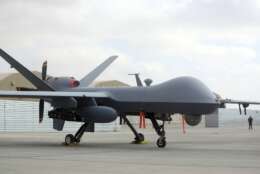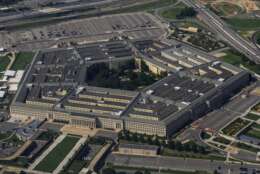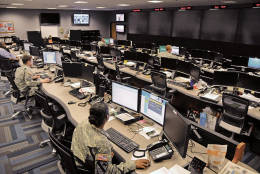Defense
-
Talk about joint service. A member of the Space Force has become the first guardian to receive a service medal from the Coast Guard. The guardian spent three weeks aboard the Coast Guard Cutter Healy in the Arctic.
November 28, 2023 -
While the Defense Department’s Replicator program will be successful if it is able to get 2,000 drones within two years, speakers at Georgetown University’s Center for Security and Emerging Technology said that the program will be more successful if this is not a one-time thing. DoD must replicate this initiative in the future whether it is with new drones or another technology to help move beyond the valley of death.
November 27, 2023 -
We all know military life can present challenges for a family. Having to constantly move from one city to another, can lead to child care issues, as well as trouble for the military spouse to find a job in a new location. Way above the national average, military spouses register an unemployment rate of more than 20%. Since 2009, an organization called, "Blue Star Families" has tried to help military families navigate the challenges they will undoubtedly face.
November 27, 2023 -
Congress is back from its Thanksgiving recess this week -- with not very much time to go before several different impending deadlines. We've talked a lot about the appropriations legislation that still needs to get done for 2024. But the deadlines for some key authorization bills are creeping up even faster. Loren Duggan is deputy news director at Bloomberg Government. He spoke with Federal News Network Deputy Editor Jared Serbu.
November 27, 2023 -
In today's Federal Newscast: The secretaries of the Army and Air Force call the hold on the confirmation of hundreds of military officers "problematic." The Government Accountability Office reports that the federal workforce is more diverse than the nationwide labor force. And improper payments crept up in 2023.
November 27, 2023 -
Eligible participants can enroll or change plans during open season for TRICARE Prime or TRICARE Select until Dec. 12. Changes will take effect on Jan. 1.
November 24, 2023 -
The average timeline for investigating top-secret security clearance cases was on a steady rise throughout fiscal 2023.
November 24, 2023 -
Between newly introduced bipartisan legislation and guidance from OPM, military spouses are getting several possible avenues to more flexible employment in government.
November 24, 2023 -
The Army and Air Force secretaries warn about how Sen. Tommy Tuberville’s (R-Ala.) holds on confirming officers are hurting the military and service members’ families.
November 22, 2023 -
In today's Federal Newscast: The Navy has a new 14-page cyber strategy that was published yesterday. House lawmakers want to offer more help to military spouses who battle mobility in order to keep their jobs. And the National Archives and Records Administration is on track to eliminate the veterans records backlog by January.
November 22, 2023 -
Continuing resolutions hurt not only service members, but also civilians both at the Department of Defense and at other agencies by hurting morale and slowing new programs.
November 21, 2023 -
The Defense Department’s responsible artificial intelligence toolkit has 70 tools to help perform tasks like studying when things go awry, as well as tools to mitigate risk and reduce bias.
November 20, 2023 -
Bill Hepworth, deputy program executive officer for the Army’s program executive office enterprise information systems (PEO-EIS), said after testing out the new contract writing system with 100 users, the plan is to triple that number in early 2024.
November 20, 2023 -
In today's Federal Newscast: Postponing maintenance at federal buildings is costing the government $22 billion. The White House has temporarily filled a top cyber job. And a Senate committee has taken a big step to help end the hold on nearly 370 military nominations.
November 20, 2023 -
DoD personnel officials have been sifting through results of a recently concluded challenge. Staff in the office of the under secretary of Defense for personnel and readiness, sought ideas from uniformed and civilian employees on how to improve what they call "talent management."
November 17, 2023
















